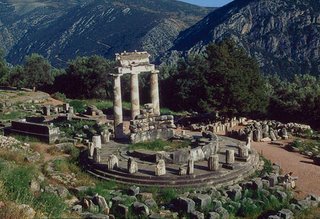I pray that some understanding and needed changes between the two churches will be gained from this visit:
Pope Benedict XVI Arrives at the Phanar
ISTANBUL, Turkey - After the welcome of Pope Benedict XVI by Ecumenical Patriarch Bartholomew, the Pope arrived at the See of the Ecumenical Patriarchate. There he was welcomed again by Patriarch Bartholomew at the airport, the Hierarchy of the Throne, clergy and numerous faithful from around the world.
The Pope's arrival to the Phanar was accompanied by the festal ringing of bells and was followed by a Doxology in the Patriarchal Cathedral of St. George. At the end of the service the Ecumenical Patriarch welcomed Pope Benedict XVI, who responded accordingly.
Before advancing to the Hall of the Throne, Ecumenical Patriarch Bartholomew and Pope Benedict XVI venerated the relics of Saints Gregory the Theologian and John Chrysostom, both former Archbishops of the Ecumenical Patriarchate and predecessors of Patriarch Bartholomew.
The relics of the two saints were taken to Rome in the 1204 sacking of Constantinople during the Fourth Crusade. It was a request from Ecumenical Patriarch Bartholomew to Pope John Paul II, who wholeheartedly accepted, that initiated the return of the relics two years ago to their original resting place of the See of the Ecumenical Patriarchate.
Ecumenical Patriarch Bartholomew, who was elected in 1991, personally attended the service at the Vatican for the return of the relics in November 2004. At that time, Pope John Paul II formally apologized for the sacking of Constantinople. The Ecumenical Patriarch also personally attended the funeral of the late Pope John Paul II last year.
Following the welcoming ceremony at the Patriarchate, Ecumenical Patriarch Bartholomew and Pope Benedict XVI met privately to discuss issues regarding Orthodox and Roman Catholic relations, including interreligious dialogue, world peace and mutual understanding.
On Thursday (Nov. 30), Ecumenical Patriarch Bartholomew will preside at the Patriarchal and Synodical Divine Liturgy at the Cathedral of St. George on the occasion of the feast day of St. Andrew the Apostle, the founder of the Church of Constantinople. This is the annual Thronal feast of the Ecumenical Patriarchate.
Pope Benedict XVI will be attending personally with his entourage the Divine Liturgy where an "exchange of the kiss of peace" and the reciting of the Lord's Prayer in Greek will take place. After an exchange of addresses and gifts, the two religious leaders will offer a joint blessing to the numerous faithful present in Greek and and Latin.








